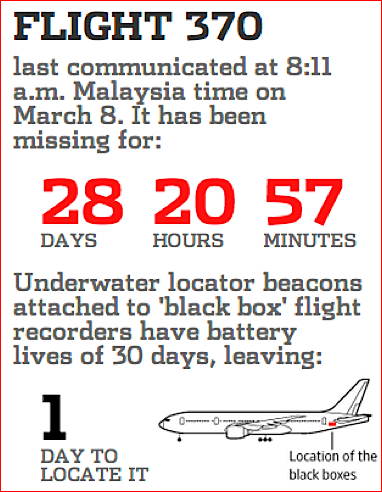« Martin Forbes | Main | San Francisco’s Worst Drivers »
April 5, 2014
Ping?

Posted by gerardvanderleun at April 5, 2014 1:09 PM. This is an entry on the sideblog of American Digest: Check it out.
Your Say
Only one day left, you mean it lasts EXACTLY 30 days? Doesn't fail sooner or possible last longer?
Posted by: plop at April 5, 2014 2:57 PM
Silliness.
Posted by: ghostsniper at April 5, 2014 7:09 PM
There's been enough time pass for anyone involved with this event to fade away or cook up a story or make "evidence" appear or disappear.
Credibility? Might as well read comic books.
Posted by: chasmatic at April 5, 2014 9:18 PM
An inspector found Malaysian Airlines was storing the pingers for the CVR and FDR not in accordance with manufacturer recommendations. Instead of storing them in 55-70 deg F the pingers were sitting on a shelf in a hot and humid hangar or warehouse. The inspector thought such conditions could reduce battery life by 50%.
I will be very surprised if either of those pingers worked for 30 days. This event has released more unreliable info than I remember in any other. The good news is that the apparent controllable nature of the end of this aircraft's fate suggests the CVR/FDR, along with the big pieces of the aircraft, will be located in a smaller region once found. If it's ever found they will find enough to confirm this event was a deliberate act of someone in the cockpit, that's to say investigators will not find evidence of a mechanical/electrical cause for this aircraft's behavior.
Posted by: Scott M at April 6, 2014 12:01 AM
Battery life is approximately 30 days; there's no automatic cutoff time. They could last somewhat longer, or have already been dead for a week. Usage, storage, temperature, manufacturing quirks, all play into it.
Posted by: waltj at April 6, 2014 4:36 AM
But they're spending an astonishing amount of money doing "something". Prestidigitation.
Just wait until the bill for the "investigation", and subsequent "Oversight Committee Panel" supplants the "missing 6B state department petty cash drawer" investigation...you know...um..'til AFTER the...uh... election.
Posted by: CaptDMO at April 6, 2014 6:08 AM
If nothing else comes of this, then CNN can run a month long show on why a critical non Eco/green government subsidized battery fails after only 30 days.
Posted by: Kelvin at April 6, 2014 7:06 AM
Scott...This was a new ship, the storage issues would be an problem if the box had been changed out. But as far as I know that's not standard procedure.
I've been looking for but haven't seen anything about the chemical composition of the batteries, lead-acid (still a lot around) don't stop abruptly but slowly decay, Ni-cad vary wildly in end of life behaviour and Lithium based batteries when they get to their expected endurance, drop off a cliff.
In any case, we are now in a two-box solution; they find it today, or they don't.
Posted by: On the North River at April 6, 2014 3:28 PM